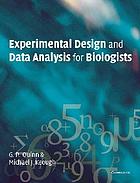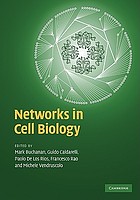Service Alert
One good reason to start your research early is that your perfect source may not be in Hege Library. But you can request or borrow many sources -- including print books and articles -- from other libraries using these programs:
 Basic Molecular Biology
by
Basic Molecular Biology
by
 Cell Biology Research Progress
by
Cell Biology Research Progress
by
 Experimental Design and Data Analysis for Biologists
by
A textbook for students or researchers in biology needing to design experiments, sampling programmes or analyze the resulting data. The text begins with a revision of estimation and hypothesis testing methods, covering both classical and Bayesian philosophies, before advancing to the analysis of linear and generalized linear models. Topics covered include linear and logistic regression, simple and complex ANOVA models (for factorial, nested, block, split-plot and repeated measures and covariance designs), and log-linear models. Multivariate techniques, including classification and ordination, are then introduced. Special emphasis is placed on checking assumptions, exploratory data analysis and presentation of results. The main analyses are illustrated with many examples from published papers and there is an extensive reference list to both the statistical and biological literature. The book is supported by a web-site that provides all data sets, questions for each chapter and links to software.
Experimental Design and Data Analysis for Biologists
by
A textbook for students or researchers in biology needing to design experiments, sampling programmes or analyze the resulting data. The text begins with a revision of estimation and hypothesis testing methods, covering both classical and Bayesian philosophies, before advancing to the analysis of linear and generalized linear models. Topics covered include linear and logistic regression, simple and complex ANOVA models (for factorial, nested, block, split-plot and repeated measures and covariance designs), and log-linear models. Multivariate techniques, including classification and ordination, are then introduced. Special emphasis is placed on checking assumptions, exploratory data analysis and presentation of results. The main analyses are illustrated with many examples from published papers and there is an extensive reference list to both the statistical and biological literature. The book is supported by a web-site that provides all data sets, questions for each chapter and links to software.
 Networks in Cell Biology
by
The science of complex biological networks is transforming research in areas ranging from evolutionary biology to medicine. This is the first book on the subject, providing a comprehensive introduction to complex network science and its biological applications. With contributions from key leaders in both network theory and modern cell biology, this book discusses the network science that is increasingly foundational for systems biology and the quantitative understanding of living systems. It surveys studies in the quantitative structure and dynamics of genetic regulatory networks, molecular networks underlying cellular metabolism, and other fundamental biological processes. The book balances empirical studies and theory to give a unified overview of this interdisciplinary science. It is a key introductory text for graduate students and researchers in physics, biology and biochemistry, and presents ideas and techniques from fields outside the reader's own area of specialization.
Networks in Cell Biology
by
The science of complex biological networks is transforming research in areas ranging from evolutionary biology to medicine. This is the first book on the subject, providing a comprehensive introduction to complex network science and its biological applications. With contributions from key leaders in both network theory and modern cell biology, this book discusses the network science that is increasingly foundational for systems biology and the quantitative understanding of living systems. It surveys studies in the quantitative structure and dynamics of genetic regulatory networks, molecular networks underlying cellular metabolism, and other fundamental biological processes. The book balances empirical studies and theory to give a unified overview of this interdisciplinary science. It is a key introductory text for graduate students and researchers in physics, biology and biochemistry, and presents ideas and techniques from fields outside the reader's own area of specialization.